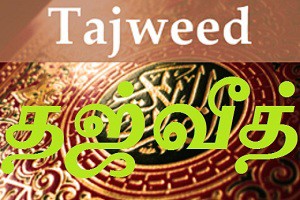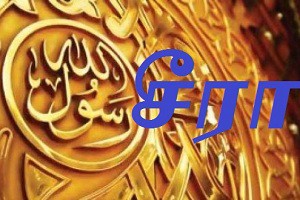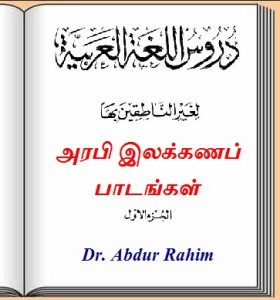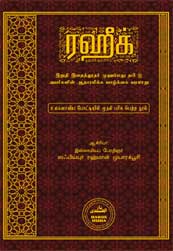Haya itself is derived from the word hayat which means life. This term covers a wide number of concepts. In English, it may be translated as modesty, shyness, self-respect, bashfulness, shame, honour, humility, etc. The original meaning of Haya according to a believer’s nature, refers to a bad and uneasy feeling accompanied by embarrassment, caused by one’s fear of being exposed or censured for some unworthy or indecent conduct. Continue reading
Jan 01
Respecting our Differences
Waste no time debating what a good Muslim should be. Be One!
– by Muhammad Alshareef
Imam Malik one day entered the Masjid after Asr. Towards the front of Masjid An-Nabawee he drew closer and sat down. Rasul Allah had commanded that anyone who enters the Masjid should not sit until he first prays 2 rakas as a salutation of the Masjid. Imam Malik was of the opinion however that Rasul Allah’s forbiddance of praying after Asr took precedence and so he would teach his students to not pray the tahiyyatul Masjid if they entered between the Asr and Maghrib time. Continue reading
Dec 01
Backbiting (Gheebah)
Allah says in the Qur’aan, “Do not backbite each other, would any of you wish to eat the flesh of your dead brother, no rather you hate it!! [Soorah Hujarat :12] Continue reading
Nov 28
Virtues of Muharram & Fasting Ashoura
– Sheikh Saleh Al-Munajjid
Muharram, the first month of the Hijra calendar, is also one of the four sacred ones about which Allah said, “Verily, the number of months with Allah is 12 months (in a year), so it was ordained by Allah on the Day when He created the heavens and the earth; of them, four are sacred. That is the right religion, so wrong not yourselves therein…” (Qur’an, 9:36)
The Prophet (peace be upon him) said, “The year is 12 months of which four are sacred, the three consecutive months of Dhul Qa’dah, Dhul Hijjah and Muharram, and Rajab which comes between Jumada and Sha’ban.” (Al-Bukhari, no. 2958)
It was reported that Ibn Abbas said that this phrase, “so wrong not yourselves therein…”, referred to all the months, then these four were singled out and made sacred. So committing sin in these months is more serious while doing good deeds brings greater reward.
Voluntary fasting:
The Messenger of Allah (peace be upon him) said, “The best of fasting after Ramadan is fasting Allah’s month of Muharram.” (Sahih Muslim)
This Hadith is probably meant to encourage fasting during Muharram, without meaning that one should fast for the entire month.
Fasting on Ashoura
Ibn Abbas said, “The Prophet (peace be upon him) came to Madina and saw the Jews fasting on the day of Ashoura. When he asked them about it, they said, ‘This is a blessed day, it is the day when Allah saved the Children of Israel from their enemies, so Musa (peace be upon him) fasted on this day.’ The Prophet (peace be upon him) said, ‘We have more right to Musa (peace be upon him) than you,’ so he fasted on that day and commanded (the Muslims) to fast on that day.” (Al-Bukhari)
Fasting on the day of Ashoura was earlier obligatory, but when fasting during the month of Ramadan was made obligatory, the obligation to fast Ashoura was cancelled. That means it is not obligatory to fast on this day, but it is recommended.
Virtues of fasting Ashoura
The Prophet (peace be upon him) said, “For fasting the day of Ashoura, I hope that Allah will accept it as expiation for the year that went before.” (Sahih Muslim)
This is from the bounty of Allah towards us. By fasting one day, He expiates our sins for the whole year. And Allah is the Owner of Great Bounty.
Fasting the ninth and tenth
Abdullah Bin Abbas said, “When the Messenger of Allah (peace be upon him) fasted on Ashoura and commanded the Muslims to fast as well, they said, ‘O Messenger of Allah, it is a day that is venerated by the Jews and Christians.’ The Messenger of Allah (peace be upon him) said, ‘If I live to see the next year, Insha Allah, we will fast on the ninth day too.’ But it so happened that the Messenger of Allah (peace be upon him) passed away before the next year came.” (Sahih Muslim)
Al-Shafi’i and his companions, Ahmad, Ishaq and others said, “It is Mustahab (recommended) to fast on both days, ninth and tenth, because the Prophet (peace be upon him) fasted on the tenth, and intended to fast on the ninth.”
Oct 01
What Allah Looks At
The Prophet (sal Allahu alaihi wa sallam) said: “Allah does not look at your appearance or property, but only at your hearts and works.”
Appearance and wealth are the criteria by which Shaytaan misguides people to judge one another. Allah (subhana wa ta’ala) has altogether another set of criteria. Since Allah is the Bestower of looks and He is the one who determines the rizq/wealth of a person, these mean nothing to Him. What the person has done to endear himself to his or her Lord is what they will be judged on. What Allah (subhana wa ta’ala) appreciates about them is their application to improving their beliefs, their hearts, their characters and their deeds.
Some people master the religious sciences but neglect to examine their outward habits and practices, not keeping their external self from sin or making it faithful in obedience. They are deluded by their learning and feel sure that they rate high with Allah (subhana wa ta’ala). Whereas, the whole point of knowing about religious practice is to apply it. Without works, it is useless. Allah Most High says, “He who purifies it (the soul) has succeeded” [Al-Quran 91:9], not “He who knows how to purify it has succeeded.”
Some people master religious learning and its outward performance, but do not examine their hearts to eliminate the blameworthy traits therein such as pride, envy, ostentation, and seeking exaltation or fame. They have made their exterior seemly while neglecting their interior, forgetting this hadith of the Prophet (sal Allahu alaihi wa sallam). Such people apply themselves to works but do not apply themselves to hearts, though the heart is the real foundation, since no one is saved “except he who comes to Allah with a pure heart.” [Al-Quran 26:89]
(Ref.:Wayoflife-islam)
Sep 01
Should You Show off
The Prophet (sal Allahu alaihi wa sallam) said: “Allah has inspired to me that you are all to be humble towards each other such that no one transgresses against or exalts himself above another.” [Sahih Muslim]
Unfortunately, the tides have so turned, that we now consider it a mark of confidence to boast about ourselves. Whatever you have, is because Allah (subhana wa ta’ala) gave it to you or allowed you to have it; whether it is intelligence, looks, wealth, lineage, faith, character or anything else.
If someone thinks that they worked hard and achieved by their own merit alone what they got, they should look at all those who also work hard but do not reach their goals. If you studied hard and excelled, who made it possible for you to have the time to study? You could have been born into a family where children have to go to work to make ends meet.
If you excel in your business, who allowed you to accumulate the capital to begin it, or gave you the ideas for it, or prevented accidents from befalling it? Who gave you the health to work for your business and kept debilitating illness away from you?
If you pride yourself on your Islam, who put your ruh into a child being born to a Muslim couple? Had you been raised on some other religion would you have come to Islam on your own? Who has surrounded you with angels and allowed you to resist Shaitaan and not turn to Kufr?
Lineage or looks are even more obviously Allah given. Therefore, there is nothing at all for you to boast about.
Allah (subhana wa ta’ala) says, “Do not praise yourselves: He knows best who is godfearing.” [Al-Quran 53:32] The only thing worthy to boast about is taqwa. And Allah (subhana wa ta’ala) forbids boasting about that too. There are two reasons for this. One is that only Allah (subhana wa ta’ala) knows how good a person really is. And only His knowing matters. He (subhana wa ta’ala) is the one who will reward us for it.
The other reason we are not to boast is that it is contrary to taqwa. A person who has true awareness of Allah (taqwa) is painfully aware of their own shortcomings, their dependence on Allah (subhana wa ta’ala) and the many sins they commit knowingly and unknowingly. Therefore, a pious person is necessarily humble and modest and can never be a braggart.
(Ref.:Wayoflife-islam)
Aug 01
The Fastest Camel
Narrated Anas (radi Allahu anhu): The Prophet (sal Allahu alaihi wa sallam) had a she camel called Al Adba which could not be excelled in a race. (Humaid, a sub-narrator said, “Or could hardly be excelled.”) Once a bedouin came riding a camel below six years of age which surpassed it (i.e. Al-Adba) in the race. The Muslims felt it so much that the Prophet (sal Allahu alaihi wa sallam) noticed their distress. He then said, “It is Allah’s Law that He brings down whatever rises high in the world.” [The Book of Jihad: Sahih Bukhari]
One of the lessons we get from this hadith is the extreme love that the Sahabah of Rasul Allah (sal Allahu alaihi wa sallam) had for him. When you love somebody very much you want everything belonging to them to be of the best kind. Seeing that the Prophet’s camel was no longer the fastest, the Muslims were upset.
The second lesson we get from this hadith is what Rasul Allah (sal Allahu alaihi wa sallam) said to his Sahabah at this time. We should not get into competition for worldly things. In this world what goes up, must come down. But as far as the Hereafter is concerned if you make it to Jannat ul Firdous, the highest level in Jannah, you will stay there forever. Jannah is where we should strive to reach the highest station and have the best, for there it is everlasting.
(Ref.:Wayoflife-islam)
Aug 01
Haadith about Growing Beards
There are various haadith where Prophet Sallallahu Alaihe Wasallam commanding the Muslims to grow a beard. Abu Huraira radiyallahu anhu quotes the Holy Prophet sallallahu alaihe wasallam as saying, “Shorten the moustache and lengthen the beard.” (Muslim). By Acting as per the sunnah of Prophet (SAW) brings pleasure of Allah & great rewards in the hereafter. Similarly opposing the sunnah of Prophet (SAW) brings the displeasure of Allah. It is stated in a hadith,
The messenger of Allah sallallahu alaihe wasallam has cursed those men who imitate women and those women who imitate men. The beard is a distinctive sign of a man and removing it is like imitating a woman. Modern scientists and doctors have realized the benefits of keeping a beard. One doctor writes, that by continually shaving, the veins of the sight are affected, resulting in failing eyesight. Another doctor writes that a lengthy beard stops harmful germs from reaching the throat and chest. Another goes so far as to say, “If men shaved for seven generations, the men in the eighth generation will have no beards. This means that the sperm gets weaker in every generation, until in the eighth this quality is completely destroyed.”
Keeping the beard is the right of every individual. Therefore, even parents cannot order their children to shave the beard. The Holy Prophet sallallahu alaihe wasallam said, “There is no obedience to any creation when the creator is being disobeyed.” In such situations where children are forced to shave their beard by their parents, the children must oppose them, for there is no obedience to anyone when the rules of Shari’ah are asked to be violated. A Muslim should strive hard to imitate the blessed Prophet sallallahu alaihe wasallam in all aspects of their life and refrain from imitating the non-Muslims.
There are numerous ahaadith in many books of hadith which describe the Holy Prophet sallallahu alaihe wasallam as having a full beard. Below are some ahaadith regarding as follows:
Ali radiyallahu anhu narrates that the Holy Prophet sallallahu alaihe wasallam was neither too tall nor too short. He had long hair and beard.
Aisha radiyallahu anha relates that the Messenger of Allah sallallahu alaihe wasallam said, “Ten things are of nature in which shortening the moustache and growing a full beard are mentioned.”
Ibn Al Jawzy narrates in Al Wafa Bi Ahwal Al Mustafa from Ali ibn Abi Talib that the Holy Prophet sallallahu alaihe wasallam had a full beard.
Muslim narrates from Ibn Umar that the Holy Prophet sallallahu alaihe wasallam said, “Oppose the Mushrikeen (polytheists), shorten the moustache and lengthen the beard.”
In another hadith, the Holy Prophet sallallahu alaihe wasallam warns the Muslims not to imitate the Kuffar. It is stated in the hadith:
The Holy Prophet sallallahu alaihe wasallam said, “One who imitates another nation, he is from amongst them.” This is a severe warning to those Muslims who wish to imitate the non Muslims in their dress and appearance.
Anas radiyallahu anhu narrates that the Holy Prophet sallallahu alaihe wasallam, most of the time used to oil his hair and comb his beard.
The Holy Prophet sallallahu alaihe wasallam used to take care of his beard and hair. In one of the hadith that has been previously mentioned, the Holy Prophet sallallahu alaihe wasallam told a man to comb his hair and beard. He also given the similarity of a man who has unkempt hair and beard with the devil.
To conclude, the Holy Prophet sallallahu alaihe wasallam has emphatically commanded the Muslims to grow a beard. He also gave a severe warning to those who oppose this command, especially those people who openly oppose it. In a hadith it is mentioned:
“All the sinners of my Ummah are forgiven except those who commit sins openly.”
This is a warning to those people who openly shave their beards and have no shame in doing this act. May Allah give us all the ability to act upon the commands of the Shari’ah. Ameen.
Jul 01
Important Principles to know
It is a well-known fact that the Prophet of Islam (saw) has been the supremely successful man in human history. But he was not just a hero, as Thomas Carlyle has called him. According to the Qur’an, he was the best example for all mankind. He has shown us the way of achieving supreme success in this world.
By studying the life of the Prophet (saw), we can derive those important principles which were followed by the Prophet (saw). Indeed, the Prophet of Islam (saw) was a positive thinker in the full sense of the word. All his activities were result-oriented. He completely refrained from all such steps as may prove counter-productive.
1. First Principle: To begin from the possible
This principle is well explained in a saying of Aishah (ra). She said: “Whenever the Prophet had to choose between two options, he always opted for the easier choice.” (Al-Bukhari) To choose the easiest option means to begin from the possible, and one who begins from the possible will surely reach his goal.
2. Second Principle: To see advantage in disadvantage
In the early days of Mecca, there were many problems and difficulties. At that time, a guiding verse in the Qur’an was revealed. It said: “With every hardship there is ease, with every hardship there is ease.” (94:5-6).
This means that if there are some problems, there are also opportunities at the same time. And the way to success is to ignore the problems and avail the opportunities.
3. Third Principle: To change the place of action
This principle is derived from the Hijrah. Hijrah was not just a migration from Mecca to Medina. It was to find a more suitable place for Islamic work, as history proved later on.
4. Fourth Principle: To make a friend out of an enemy
The Prophet (saw) of Islam was repeatedly subjected to practices of antagonism by the unbelievers. At that time the Qur’an enjoined upon him the return of good for evil. And then, as the Qur’an added, “You will see your direst enemy has become your closest friend” (41:34).
It means that a good deed in return of a bad deed has a conquering effect over your enemies. And the life of the Prophet (saw) is a historical proof of this principle.
5. Fifth Principle: To turn minus into plus
After the Battle of Badr, about 70 of the unbelievers were taken as the prisoners of war. They were educated people. The Prophet (saw) announced that if any one of them would teach ten Muslim children how to read and write he would be freed. This was the first school in the history of Islam in which all of the students were Muslims, and all of the teachers were from the enemy rank. Here I shall quote a British orientalist who remarked about the Prophet of Islam (saw): He faced adversity with the determination to writing success out of failure.
6. Sixth Principle: The power of peace is stronger than the power of violence
When Mecca was conquered, all of the Prophet’s (saw) direst opponents were brought before him. They were war criminals, in every sense of the word. But the Prophet (saw) did not order to kill them. He simply said: “Go, you are free.” The result of this kind behavior was miraculous. They immediately accepted Islam.
7. Seventh Principle: Not to be a dichotomous thinker
In the famous Ghazwa of Muta, Khalid bin Walid decided to withdraw Muslim forces from the battlefield because he discovered that his army was disproportionately outnumbered. When they reached Medina, some of the Muslims received them by the word “O Furrar (O deserters!)” The Prophet (saw) said “No. They are Kurrar (men of advancement).”
Those Medinan people were thinking dichotomously, either fighting or retreating. The Prophet (saw) said no. There is also a third option, and that is to avoid war and find a time to strengthen yourself. Now history tells us that the Muslims, after three years of preparation, advanced again towards the Roman border and this time they won a resounding victory.
8. Eighth Principle: To bring the battle in one’s own favorable field
This principle is derived from the Ghazwa of Hudaibiyya. At that time, the unbelievers were determined to engage Muslims in fighting, because obviously they were in an advantageous pÿosition. But the Prophet (saw), by accepting their conditions unilaterally, entered into a pact. It was a ten-year peace treaty. Until then, the meeting ground between Muslims and non- Muslims had been on the battlefield. Now the area of conflict became that of ideological debate. Within two years, Islam emerged as victorious because of the simple reason of its ideological superiority.
9. Ninth Principle: Gradualism instead of radicalism
This principle is well established by a hadith of Al-Bukhari. Aishah (ra) says that the first verses of the Qur’an were related mostly to heaven and hell. And then after a long time when the people’s hearts had softened, the specific commands to desist from adultery and drinking were revealed in the Qur’an. This is a clear proof that for social changes, Islam advocates the evolutionary method, rather than the revolutionary method.
10. Tenth Principle: To be pragmatic in controversial matters
During the writing of Hudaibiyya treaty, the Prophet (saw) dictated these words: “This is from Muhammad, the Messenger of God.” The Quraysh delegate raised objections over these words. The Prophet (saw) promptly changed the word and ordered to write simply Muhammad, son of Abdullah.
These were the principles through which the Prophet of Islam (saw) gained that success which has been recognized by historyians as the true success.
Jun 01
The Partnership between Body and Soul
– Sheikh Salman al-Oadah
The dualism between the body and soul is very clearly evident in the physical world. The body is subservient and the soul is in charge; however both are indispensable. It is just that the soul is the master while the body is the obedient servant. Continue reading










கருத்துரைகள் (Comments)